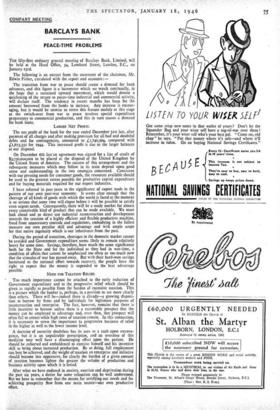BARCLAYS BANK
PEACE-TIME PROBLEMS
THE fifty-first ordinary general meeting of Barclays Bank, Limited, will be held at the Head Office, 54, Lombard Street, London, E.C., on January 23rd.
The following is an extract from the statement of the chairman, Mr. Edwin Fisher, circulated with the report and accounts:— The transition from war to peace should create a demand for bank advances, and this figure is a barometer which we watch continually, in the hope that a sustained upward movement, which would denote a quickening of the return to peace-time industrial and commercial activity, will declare itself. The tendency in recent months has been for the amount borrowed from the banks to increase. Any increase is encour- aging, but it would be unwise to stress this feature unduly at this stage as the switch-over from war to peace involves special expenditure preparatory to commercial production, and this in turn causes a demand for bank loans.
LARGER NET PROFIT.
The net profit of the bank for the year ended December 31st last, after payment of all charges and after making provision for all bad and doubtful debts and for contingencies, amounted to £1,740,594, compared with £1,673,351 for 1944. This increased profit is due to the larger balances at our disposal.
On December 6th last'an agreement was signed for a line of credit of $3,750,000,000 to be placed at the disposal of the United Kingdom by the United States of America. The success of this arrangement and the subsequent measures which may follow in its train depend upon good sense and understanding in the two countijes concerned. Consistent with our pressing needs for consumer goods, the resources available should be used to the greatest extent possible for productive capital expenditure and for buying materials required for our export industries.
I have referred in past years to the significance of export trade in the pattern of our own post-war economy. It seems clear enough that the shortage of all kinds of goods with which the world is faced at the moment is so serious that some time will elapse before it will be possible to satisfy even urgent needs. Consequently, there will be a ready market for almost every conceivable kind of product that can be made available. We must look ahead and so direct our industrial reconstruction and development towards the creation of a highly efficient and flexible productive machine, freed from unnecessary controls and regulations, embodying in the fullest measure our own peculiar skill and advantage and with ample scope for that native ingenuity which is our inheritance from the past.
During the period of transition, shortages in the domestic market cannot be avoided and Government expenditure seems likely to remain relatively heavy for some time. Savings therefore, have much the same significance both for the State and for the individual as they had in war-time, a condition of affairs that cannot be emphasised too often or too much now that the stimulus of war has passed away. But with their hard-won savings harnessed to the national effort towards recovery, the people have the right to expect that the money is expended to the best advantage possible.
NEED FOR TAXATION RELIEF.
Too much importance cannot be attached to the early reduction of Government expenditure and to the progressive relief which should be given as rapidly as possible from the burden of excessive taxation. This is a picture which the banker is perhaps, in a position to see more clearly than others. There will be—indeed there is already—a growing disposi- tion to borrow by firms and by individuals for legitimate purposes of reconstruction and enterprise. The fact, however, remains that there is little incentive to borrow unless there is a reasonable prospect that the money can be employed to advantage and, even then, that prospect will often fail to attract while high rates of taxation remain. In this connection, it is necessary to stress the importance to progressive business of relief in the higher as well as the lower income level.
A doctrine of austerity doubtless has its uses as a curb upon extrava- gance, but it is an unpalatable prescription, and an overdose of this medicine may well have a discouraging effect upon the patient. He should be exhorted and emboldened to exercise himself and his inventive skill to bring about increased production. By so doing, full employment can best be achieved, and the weight of taxation on enterprise and initiative should become less oppressive for clearly the burden of a given amount of taxation becomes lighter the greater the volume of production and business activity upon which it is levied.
After what we have endured in anxiety, exertion and deprivation during the past six years, a desire for some relaxation can be well understood. But we have to remember that the means for satisfying our needs and for achieving prosperity flow from one main source—our own productive effort.


























 Previous page
Previous page